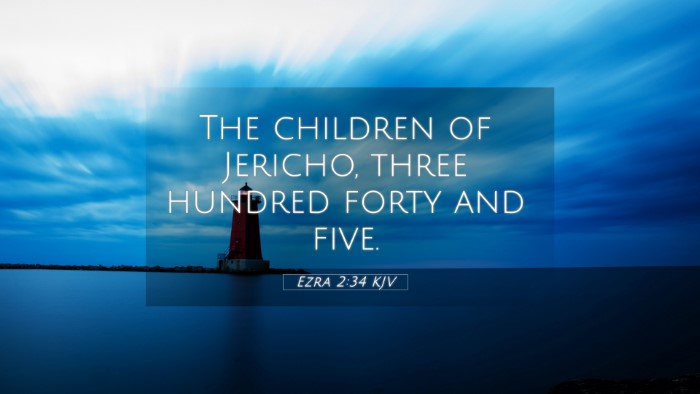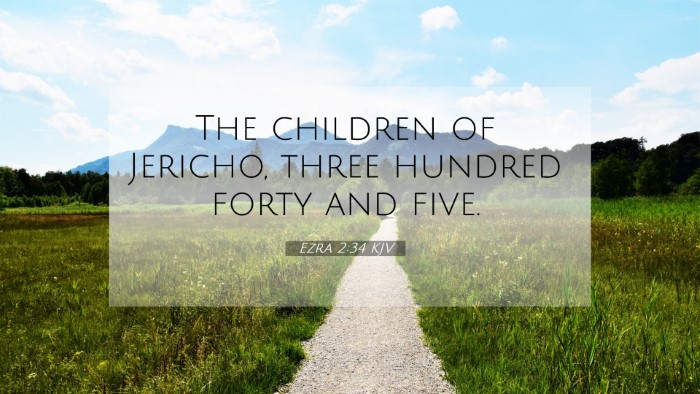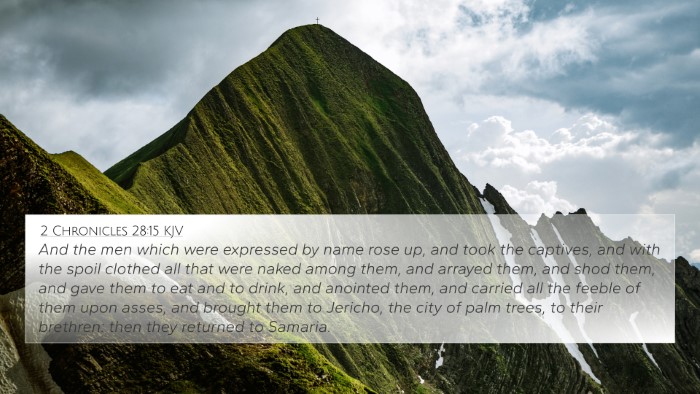Understanding Ezra 2:34
Ezra 2:34 states: "The children of Jericho, three hundred forty and five." This verse is part of a larger narrative that details the return of the exiles from Babylon to Jerusalem, listing the families and numbers of those who came back to rebuild their homeland.
Summary of Insights from Public Domain Commentaries
Matthew Henry's Commentary
Matthew Henry emphasizes the significance of the children of Jericho in the context of restoration. He notes that their return signals God's faithfulness to His promises and showcases the resilience of God's people. Jericho, a city with a storied past (having been conquered by Joshua), symbolizes both struggle and triumph. Henry suggests that the numbers detailed reflect God's order in the rebuilding process.
Albert Barnes' Commentary
Albert Barnes highlights that the specific mention of Jericho indicates the importance of each individual and family in the collective effort to restore Jerusalem. He suggests that the small number of 345 could reflect the hardships faced throughout their exile and a call to remain faithful amidst adversity. Barnes sees this verse as a reminder of the continuity of God's people and the importance of each member in fulfilling divine purpose.
Adam Clarke's Commentary
Adam Clarke provides a contextual analysis of the verse, relating it to the historical setting of the Israelites returning from exile. He points out that Jericho was the first city to be captured in the Promised Land, and the mention of its children emphasizes the theme of new beginnings and restoration. Clarke suggests that even a small number of returning exiles represents hope and a divine plan, as every count contributes to the rebuilding of a greater community.
Bible Verse Cross-References
The following cross-references illustrate connections between Ezra 2:34 and other scripture that enhance understanding and provide context:
- Joshua 6:20 - The fall of Jericho, illustrating the significance of victory and the origins of the returned exiles.
- Nehemiah 7:36 - A parallel account of the families that returned to Jerusalem, reinforcing the importance of the community dynamics.
- 1 Chronicles 9:10-16 - The listing of Levites and priests, indicating a structured community returning for worship and service.
- Isaiah 44:28 - Prophecy that God would use Cyrus to restore Jerusalem, showing divine planning in the people's return.
- Ezra 3:1 - The gathering of the people to rebuild the altar, emphasizing communal worship and restoration efforts.
- Haggai 1:1-4 - God’s call to rebuild the temple, reinforcing the purpose for which the returned families are called back.
- Matthew 1:12 - Genealogy linking back to the returnees, emphasizing the importance of these families in God's lineage.
Thematic Bible Verse Connections
The themes presented in Ezra 2:34 can also relate to broader biblical narratives:
- Hope and Restoration: The return from exile symbolizes God’s faithfulness to His covenant.
- Community and Family: Each family unit’s return signifies collective identity and purpose within God's plan.
- Faithfulness in Adversity: The mention of numbers suggests perseverance through hardship.
- Preparation for Worship: The return of families was essential for the restoration of temple practices.
Tools for Bible Cross-Referencing
Engaging with cross-references can be effectively done through various Bible study tools:
- Bible Concordance: A comprehensive listing of words and phrases for locating verses and understanding themes.
- Bible Cross-Reference Guide: Resources designed to connect verses by theme and context.
- Cross-Reference Bible Study: Methods to explore connections between verses, enhancing understanding of scripture.
Conclusion
Ezra 2:34 serves as a significant marker in the biblical narrative of return and restoration. The insights from various commentaries reveal the depth of individual and collective identity, underscoring God’s faithfulness throughout history. By employing tools for cross-referencing, readers can deepen their understanding of how biblical texts relate to one another, enriching their study of the scriptures.





